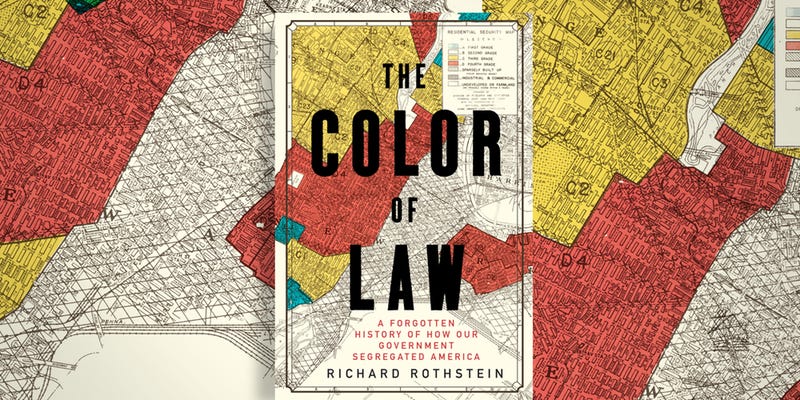

Discover more from UrbanTech
Hi, it's John. Thanks for subscribing! I hope to share what I'm learning and reading each week at the intersection of urbanism and the innovation economy. Since I'm new to the game, I'd love to hear your feedback and any thoughts on how to make this as helpful to you as possible. Just reply to this email or shoot me a note at jrthomey@icloud.com. Let's dive in!
A Long Thing: The Color of Law

It's easy to say we are in unprecedented times in our country's history when it comes to race relations. To truly understand the systemic racism that infects our institutions, we must look back to how government and the private sector built these systems and the legacies they leave behind. In my opinion, no system has propped up segregation and inequity in our country more than housing.
A couple of years ago, I read The Color of Law by Richard Rothstein, a distinguished fellow for the Economic Policy Institute (EPI). In the book, Rothstein traces how our government and private institutions segregated housing throughout the country in the 20th Century.
This summary by EPI is a great summary of Rothstein's argument in the book:
“To scholars and social critics, the racial segregation of our neighborhoods has long been viewed as a manifestation of unscrupulous real estate agents, unethical mortgage lenders, and exclusionary covenants working outside the law. This is what is commonly known as “de facto segregation,” practices that were the outcome of private activity, not law or explicit public policy. Yet, as Rothstein breaks down in case after case, private activity could not have imposed segregation without explicit government policies (de jure segregation) designed to ensure the separation of African Americans from whites.”
The book includes plenty of examples to illustrate Rothstein's argument that segregation in housing is implicit and explicit in public policy:
The first civilian public housing program frequently demolished integrated neighborhoods to create segregated public housing.
The FHA (Federal Housing Administration) in numerous instances would only guarantee bank loans for construction and development on condition that no homes be sold to African Americans. The most well-know examples is probably Levittown in Long Island, which became a model for suburban developments for decades to come.
Across the country, lenders and financial institutions enacted policies known as redlining, which refused loans or insurance to individuals because they live in an area "deemed to be a poor financial risk" i.e. where most people of color lived.
The book includes many more examples and is a great read for anyone looking to learn more about the systems that prop up systemic racism in housing. Two key points I will leave you with:
These policies played out all over the country, not just in the deep south, where you might first assume segregation would occur.
This is more than just a housing story. For most Americans, homeownership is the biggest source for wealth growth. Housing is crucial to your access to work, a quality education system, healthcare, food and much more.
What I'm reading this week
CityLab: America’s Cities Were Designed to Oppress
Beyond policies like those covered in The Color of Law, racism infects design in our cities and public spaces. Physical space has been weaponized against communities of color. Bryan Lee explores for CityLab the connection of design and oppression, then provides some concrete solutions to ameliorate the problems we've created.
Financial Times: Blackstone’s property arm assets swell to €250bn
Blackstone is the biggest real estate investor in the world and is positioning itself for the current downturn from COVID. To save you the calculation, Blackstone has roughly $283 billion under management.
I found this quote from Inrev's Henri Vuong interesting: "There is likely to be a pause while managers assess how coronavirus affects property markets in different countries. But many smaller and medium-sized managers still want to build greater scale and to expand their geographical footprint so we may see more opportunistic deals if assets are revalued or become available at a slightly lower price”.
It is optimistic with so much uncertainty in the world right now. That said, people always make money during economic downturns and Blackstone and firms of similar size like Brookfield are positioning themselves to take advantage of the circumstances.
CNBC: Uber exasperated with Grubhub sale process as deal slips away
Remember when Uber was going to buy Grubhub? According to sources, they are pulling out because of anti-trust concerns with the deal and the new market leader it would have created.
I'm positive someone much smarter (like Ben Thompson) will write on the business strategy of the deal. What's interesting to me is the impact technology has on the restaurant industry in cities across the world.
This is the perfect example of how the innovation economy can have both good and bad implications. Without question, delivery apps have opened up new sources of revenue and made delivery operations for restaurants easier.
Delivery apps can eat 20-30% of revenue from an order. In a small margins industry like restaurants, some restaurants are even going out of business because of a rise in app deliveries.
TechCrunch: Propzy, a Vietnamese offline-to-online real estate platform, raises $25 million Series
Propzy, which guides consumers through the entire process of a real estate transaction, announced it raised a $25 million Series A led by Gaw Capital and SoftBank Ventures Asia. Other investors included Next Billion Ventures, RHL Ventures, Breeze, FEBE Ventures, RSquare and Insignia.
There are certainly quite a few companies working to solve unessacarry friction in real estate deals (Softbank has even invested in a few!). The question I think remains though: Is friction in transactions the biggest problem in the real estate world or just the easiest to solve?
My personal opinion is the latter and we are still waiting for technology and innovation to tackle much bigger problems like construction efficiency.
Curbed LA: You can now buy a piece of Echo Park for $100
Jenna Chandler, editor of Curbed LA, profiles a company I've been watching for a little while now, Nico (the neighborhood investment company). Nico allows Angelenos to own a piece of their neighborhood. Nico aims to unlock property investment in neighborhoods for all residents, including renters. Typically only people with lots of money have had the opportunity to do this.
"Nico is offering $10 shares to the public in its small real estate portfolio, an amount that’s unusually low for the real estate investment game. Anyone can buy in, but investors who live in and around Echo Park have different redemption rights, and every investor must purchase at least 10 shares, for a minimum investment of $100. That secures a financial stake in the company and a say in how it operates. Nico’s officers are also giving $1,000 worth of shares to the tenants in their 80 apartments."
While it's not going to save the world, unlocking real estate investments for more people, especially renters, is great. I'm interested to see how this company scales and if they are truly able to keep money invested in communities.
The Wall Street Journal: Who Needs Cities When We All Work From Home?
The past few months have raised questions on what the future of work looks like and if we are destined to work remotely long-term. Personally, I'm a bit bearish that we will transition the entire economy to remote work permanently. I think companies like Facebook and Twitter, which have announced plans for their entire workforce or a vast majority to be remote, were already moving in this direction. Their timetables were just accelerated. I also don't think cities are in peril.
I'm interested to see how workers at these companies react now that the talent pool and their competition is now infinitely bigger.
I don't think people move to the Bay Area or NYC for just one job. They also move for a network of jobs and opportunities to leverage.
Car and Driver: Amazon Reportedly in Talks to Buy Autonomous-Vehicle Startup Zoox
While talking to a friend who is a reporter a few weeks back, he mentioned he wouldn't bet against Bezos in the AV race. Well, it looks like Amazon is going to be diving into the space.
The race for AVs is still a major money trap that requires a massive war chest to compete for a product that is perhaps years away. Although, Amazon with the support of AWS and its other technologies (like robotics) can reduce some of the costs.
I also want to point out that AVs would be a major boon for Amazon's core business through driverless deliveries.
Thanks for reading the inaugural edition! Please reach out with any questions or thoughts on how can I can improve this for you. Please also share Urban Tech with your friends and colleagues who might enjoy it. Talk next week.✌🏼
JT
Subscribe to UrbanTech
A media brand focused on the intersection of cities and innovation.








